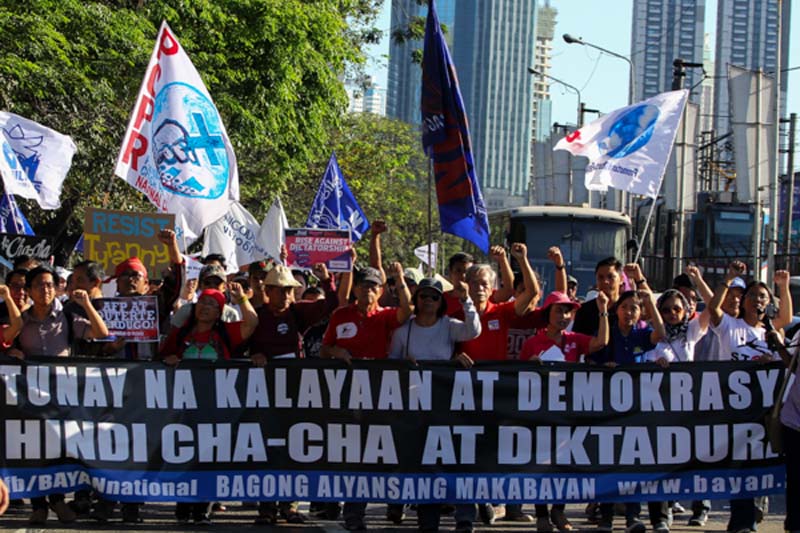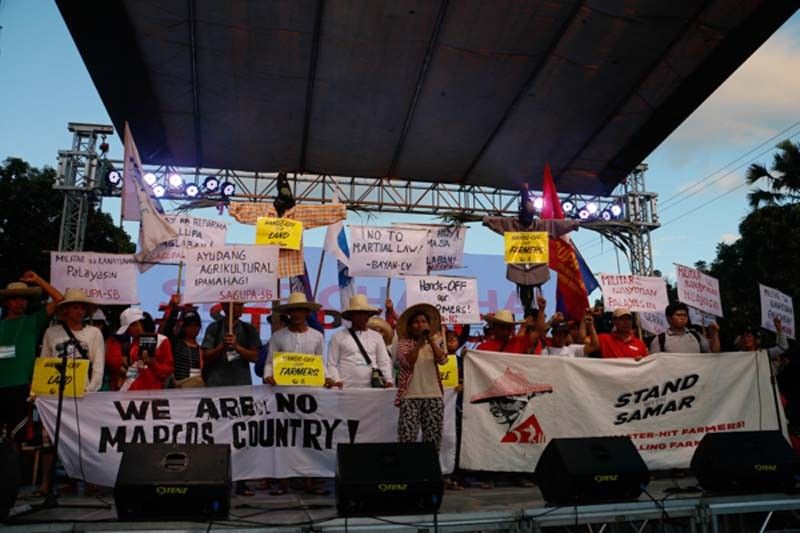Part 1: Setting the pieces*
MANILA, Philippines — President Rodrigo Duterte has openly expressed his
disdain for human rights. He has declared martial law in Mindanao to quell the rise of Islamic extremism in the region and accused some media organizations of unfair reporting and openly criticized their owners for their sins. He has also publicly lashed political opponents and his fiercest critic is currently in detention.
These actions, and many more, have led some Filipinos to think that Duterte is showing echoes of ousted dictator Ferdinand Marcos, whose rule from 1965 to 1986 was marked by massive cases of abuses and corruption.
A host of differences separates Duterte and Marcos ranging from style, choice of Cabinet appointees and even their vision for the nation, but experts interviewed by Philstar.com believe the Philippines may be sliding toward another era of strongman rule.
"It's very clear that the country is. Definitely," Randolf David, a sociologist from the University of the Philippines, said when asked if the Philippines is barreling toward a form of "dictatorship."
David, more popularly known by his nickname Randy, explained that a dictatorship means the elevation of an individual and a party above the law. He added that there is also a disrespect for procedure and due process and the use of fear and intimidation to get your way under a dictatorial form of government.
"You set aside institutions in favor of an instinctive, implicit trust in somebody whom you like, who you think is good for the country, whatever he says, whatever he does," he said.
Loretta Ann Rosales, a former party-list representative and former chairperson of the Commission on Human Rights, shares David's observation.
"The fact that he is not interested in human rights, you need rule of law, you need due process, you need all of these things to run government, but he doesn't like to run government from a human rights lens... so if you don't like human rights, necessarily, you are authoritarian," Rosales, whose party Akbayan had close ties to the now decimated Liberal Party while it was in power, said.
Duterte and his allies have shunned the comparison to Marcos, with the chief executive saying that he would not try to perpetuate himself in power.
However, in one event, Duterte himself did not shy away from the tag "dictator" as some of his critics have painted him.
"Yes, it is true. I am a dictator. I have to be a dictator for the good of the country," the president told more than 200 former Maoist rebels who had surrendered to the government and dined with him at the presidential palace.
Opening moves
Political analyst Dennis Coronacion of the University of Santo Tomas said that Duterte's actions are part of the president's efforts to "consolidate his power."
Some leaders, like former President Fidel Ramos, could reach out to their opponents and form a broad coalition, Coronacion said, while others would appoint individuals who would remain loyal despite challenges to their authority.
"Others will go to the extent of scheming to remove defiant government officials whose terms of office are protected by the Constitution," he said.
Vice President Leni Robredo was forced to resign from the Cabinet just five months since her appointment after Cabinet Secretary Leoncio Evasco told her to stop attending Duterte's meetings with his senior officials at the wood-paneled presidential palace.
Sen. Leila De Lima, who initiated probes into extrajudicial killings in Davao City during Duterte’s time as its mayor, this weekend marked her first anniversary since she was arrested and detained at Camp Crame on drug-related charges she claims are motivated by politics.
Former Commission on Elections Chairperson Andres Bautista resigned last year after the House in plenary overturned the decision of its justice panel to junk the impeachment case against him.
Commission on Higher Education Chairperson Patricia Licuanan stepped down after receiving a phone call from Executive Secretary Salvador Medialdea. Licuanan, whose term was set to end in July 2018, was appointed by former President Benigno Aquino III in 2010 and reappointed in 2014.
Currently, Duterte's allies at the House are leading efforts to impeach Chief Justice Maria Lourdes Sereno over allegations of corruption and improper use of public funds.
Volunteers Against Crime and Corruption, a group supportive of Duterte, has also made efforts to impeach Ombudsman Conchita Carpio-Morales. The former head of VACC, Dante Jimenez, has since been given a Cabinet position.
David believes the authoritarianism found during Marcos' time and today under Duterte are different. He said dictatorships during Marcos' time, which could be found in many Southeast Asian countries, were more "developmentalist" in nature while authoritarianism today is more of a reaction to the complexities of globalization.
This can be seen in Marcos' and Duterte's choice of Cabinet officials, he said.
Marcos, according to David, had his entire program of government clear in his mind, and chose the best minds to realize this goal.
Some of those Marcos appointed to crucial government posts were Onofre Corpuz, Cesar Virata, Gerardo Sicat, Alejandro Melchor, Jaime Laya and Arturo Tanco. David noted that many of these men were educated in the best universities in the world.
Duterte, in contrast, was not "very, very particular" about the individuals who would compose his official family, except for those on his economic team, and did not appear to have a grand vision for the nation.
"The choices of Duterte, if you look at it from a technocratic perspective, do not inspire much confidence."
Among Duterte's appointees are Presidential Communications Assistant Secretary Mocha Uson, an entertainer and blogger who, when accused of spreading false information, counters she is only giving her opinion and, anyway, she is not a journalist.
The president also gave posts to former whistleblower Sandra Cam and television show host Arnel Ignacio.

President Duterte's allies and supporters say that protest marches show that the government is upholding rights and freedoms guaranteed by the 1987 Constitution. The House of Representatives is considering a proposal to amend the bill of rights to protect only "the responsible exercise" of these rights. "There is so much abuse of this freedom," Rep. Fredenil Castro (Capiz), who proposed the amendment in January, said. Philstar.com/Efigenio Toledo IV
The military connection
Another similarity shared by the two leaders is their fondness for appointing former military men to government bureaucracy.
For Coronacion, this has been a common practice among presidents and a phenomenon not confined to Duterte and Marcos.
Defense Secretary Delfin Lorenzana, Interior Department officer-in-charge Eduardo Año, National Security Adviser Hermogenes Esperon, Environment Secretary Roy Cimatu and National Irrigation Authority Ricardo Visaya are just some of the prominent former military officers in the Duterte administration.
David said the president needs these military figures in government to ensure that there is no "disenchanted soul" in the Armed Forces who will mount an uprising against him.
Military personnel recently received a pay raise from the government, with the lowest-ranked officers receiving a 100-percent raise and senior officers having substantial increases. The president has also inaugurated housing projects for the military and replaced units that were occupied by an urban poor group last year.
Duterte has also visited military camps all over the Philippines to rally troops and assure them of his support. At the height of the siege of Marawi, he was even hit for paying more visits to soldiers than local residents displaced by the fighting.
However, David and Rosales believe that the military today is more professional and has learned its lesson from playing politics.
Duterte might also be aware that the military is still wary of him following his rapprochement with Maoist rebels and with China as the Armed Forces remains heavily pro-American, having trained closely with American troops over the past decades as a military ally.
The relationship between Duterte and the rebels has soured in past months following accusations from both sides that armed offensives were continuing despite peace talks. Just this week, the Justice Department moved for a court to declare the New People's Army, the armed wing of the communist rebels, a terrorist group.
*This special report for the 32nd anniversary of the People Power Revolution is the first of three parts.
In the shadow of a strongman (Part 2): Then and now, the Philippine political landscape has been marked by student protest actions and security threats in the form of rebellion and the threat of terror attacks
































